Do cats cry? When cats’ eyes water, does it mean they’re sad? Or is there something else causing fluid to spill over their lower eyelids?
Does your cat have feelings the same way you do? Can it be happy, angry and sad? Well, what’s for sure is that cats are anything but indifferent. They react very sensitively to their environment. Anyone who truly knows their cat will probably also understand its mood. In fact, most cat owners can tell what their feline friends are feeling just by observing their body language. Pure joy expresses itself differently than deep sadness. And grief? Cats can grieve! When we humans are sad, tears roll down our face. Is this the case with cats too?
Do cats shed tears when they’re sad? And do our feline friends even notice when we’re sad?
Can cats cry?
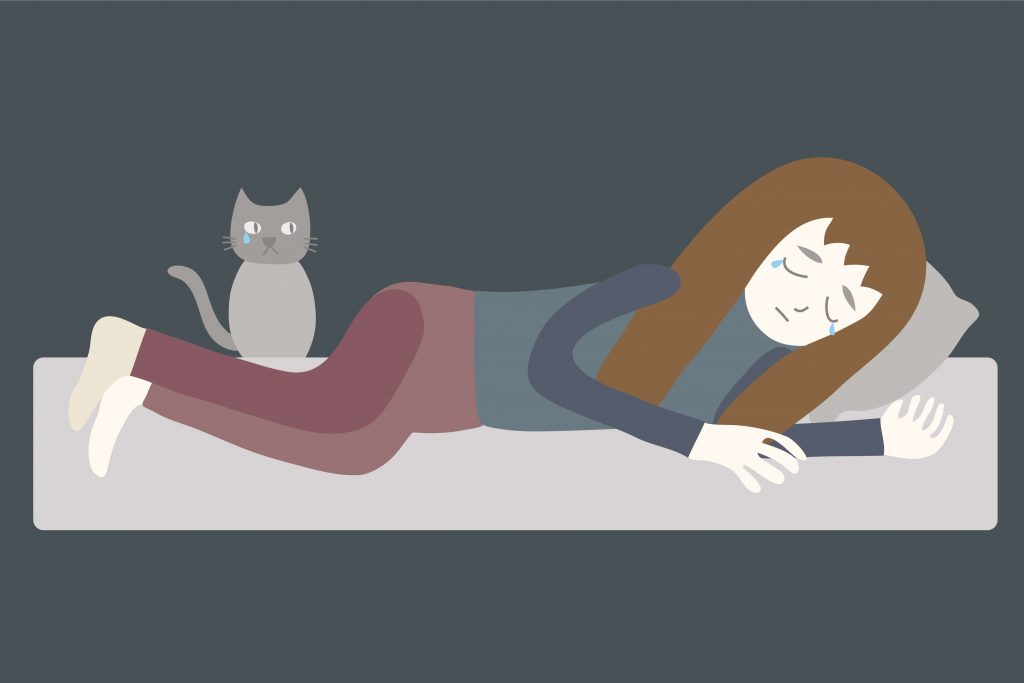
Do cats cry the same way we humans do? Both cats and humans are mammals, which means that when something causes them to produce tears, these four- and two-legged friends will “cry” in a similar way. As soon as their tears are triggered, their autonomic nervous systems will crank up the production of fluid in the lacrimal glands. After a certain amount of fluid makes its way to their eyes, the pathways that transport these fluids will become overwhelmed. At first, there will only be a kind of congestion, but then at some point the dam will break. At that point, nothing can stop the tears. The result is that the conjunctival sacs in the eyes will literally start to overflow. And then we cry.
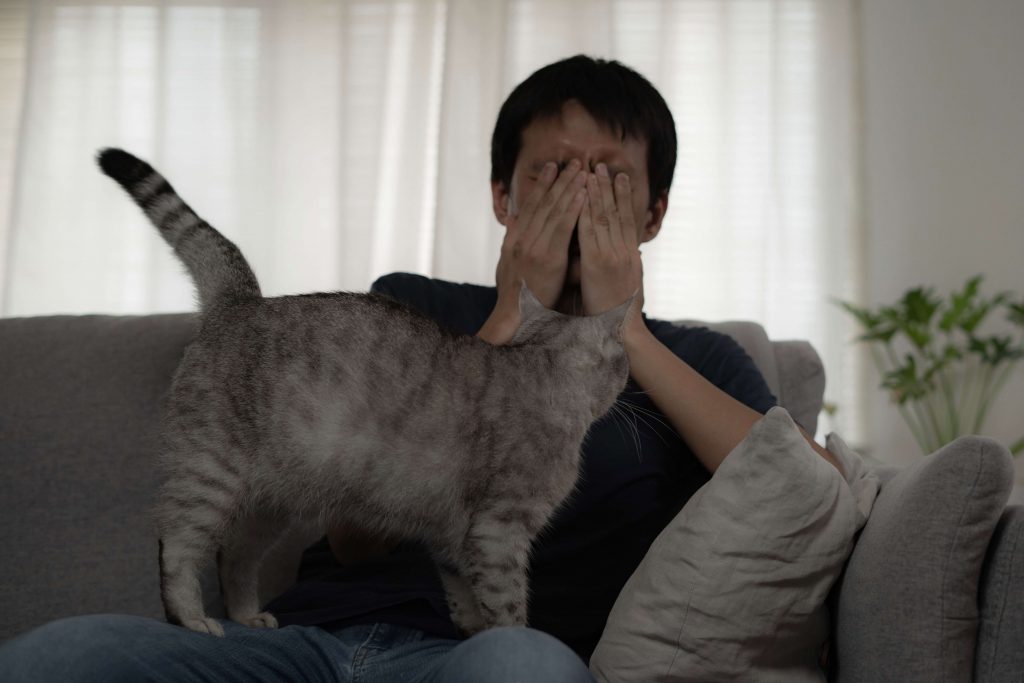
Can cats shed tears?
Cats can cry. Since feline eyes have a similar anatomical structure to human eyes, it’s possible for cats to shed tears. Just like us humans, a cat’s eyes produce tears in glands that look like mini almonds. These tear glands are where the tear fluid of the cat’s eyes is produced. The process by which tears are produced is actually quite similar in humans and cats. And it makes no difference what triggers the production of tears, what kind of tears they are or what purpose they serve.
Can cats cry when they’re sad?
Do sad cats cry? From an evolutionary point of view, emotional crying is something only we humans do. Only humans have all three types of tears, namely basal, emotional and reflex tears. When we’re overcome by strong emotions, it’s natural for us to cry. This happens when we’re sad or angry, but also when we’re happy. Our emotions cause the tears to flow. The only types of tear production that occurs in animals, however, are the basal and reflex types. In other words, when cats cry, they’re not necessarily sad. To think that would be to misinterpret the cats’ tears.
Memorize:
Not all tears are the same.
Tears differ depending on the purpose they’re designed to serve.

There are three different types of tears:
- Basal tears to keep the eyes moist and act as a protective layer
- Emotional tears, which flow in the case of sadness, anger or joy
- Reflex tears, which flood the eye to rid it of intruders
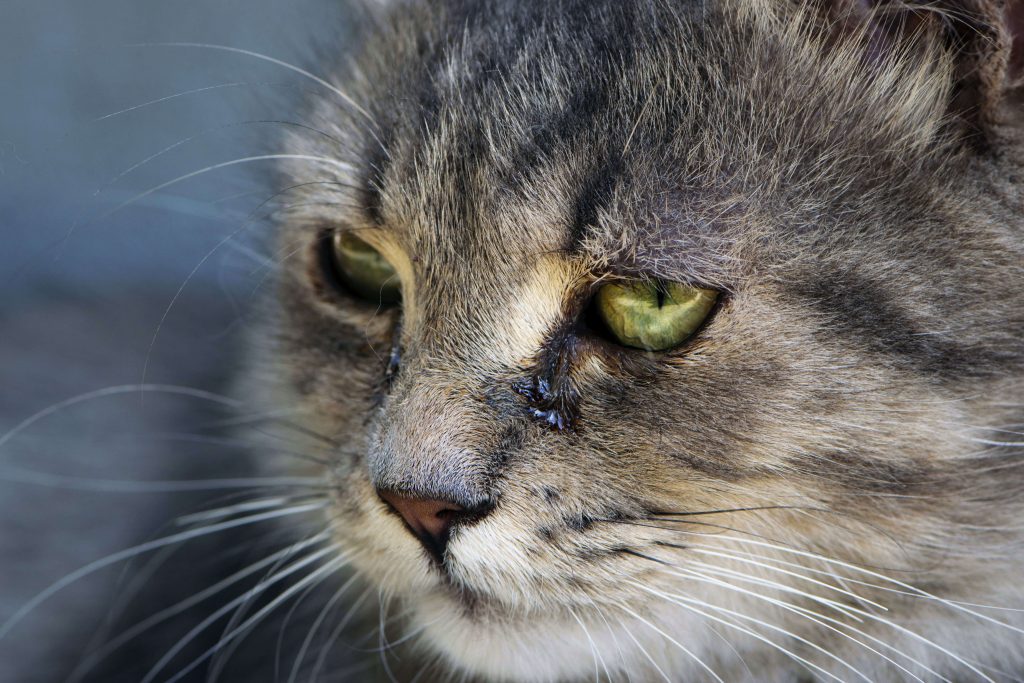
The meaning of tears in cat eyes

What does it mean when cats have tears and watery eyes? A look says more than a thousand words: “Have you forgotten me? I’m the one who desperately needs petting!” In addition to body language, a cat’s eyes are its key means of non-verbal communication. But your cat’s eyes not only show what mood it’s in, they also indicate whether it might be “incubating” some kind of disease. You should take a closer look at your cat’s eyes on a regular basis: Do they look any different than usual? Are they slightly red or watery? Tears can be a sign that something is bothering your cat.
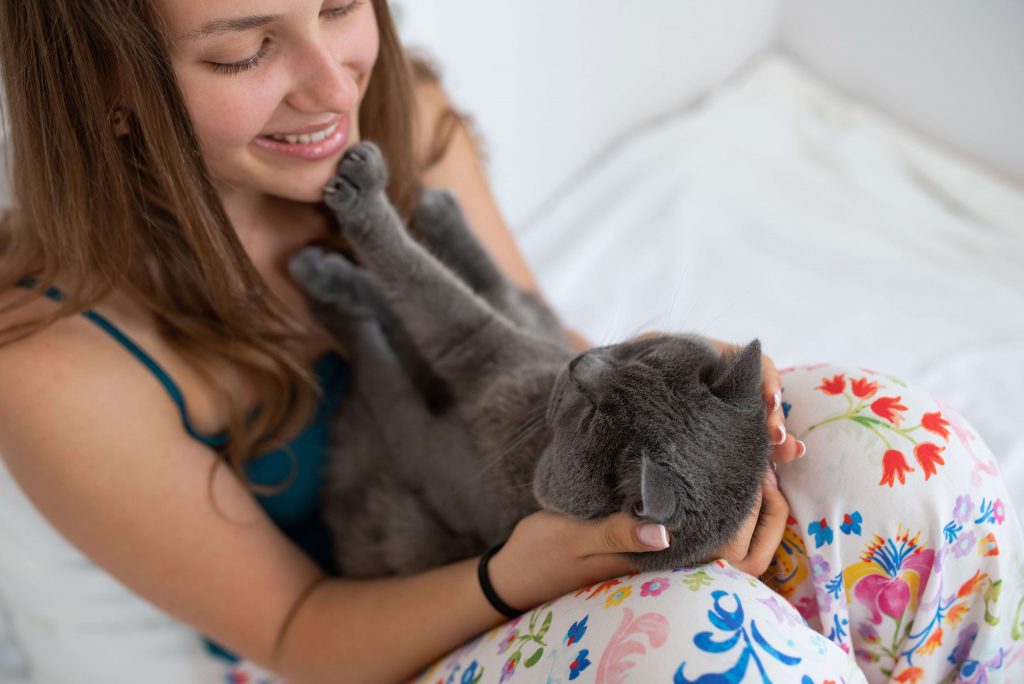
When cats’ eyes water due to a foreign object
If there’s a foreign object in your cat’s eye, it will probably start watering. It’s a very unpleasant feeling to have something in your eye, right? The same goes for your cat: whatever the foreign object is, it will irritate the surface of the eye immensely. Especially if only one of your cat’s eyes is affected, it’s very likely because there’s a foreign object in that eye. Your cat’s reflex tears will spring into action, flooding the eye as a way of flushing out the annoying intruder. These tears will appear in your cat’s eye until the bothersome object has been successfully removed.
When cats tear up due to allergies
An allergy can cause tears to flow in cats. Allergies in cats are triggered by particular substances. If so-called aeroallergens are involved – these are substances that spread through the air – they can cause respiratory problems and eye discharge, making it look like your cat is weeping. When an allergic cat comes into contact with allergens it classifies as dangerous, the watchdogs in their body will sound the alarm, causing their immune system to massively ramp up its defences. The result is a classic allergic reaction.
When cats’ eyes water in warm or cold air
Extreme changes in ambient air temperatures will definitely cause a cat’s eyes to water. This is because basal tears are designed to help out in the case of warm or cold air. They serve to moisten a cat’s eyes more vigorously so that they remain healthy and in good condition. Tear fluid helps to keep the protective surface of a cat’s eye – the cornea – intact. One of the things that might help your cat’s eyes in this case is a drinking fountain, which can act as an additional humidifier and improve the quality of indoor air for your cat.
Drinking fountains for cats – Helpful tips and tricks | Cat’s Best (catsbest.de)
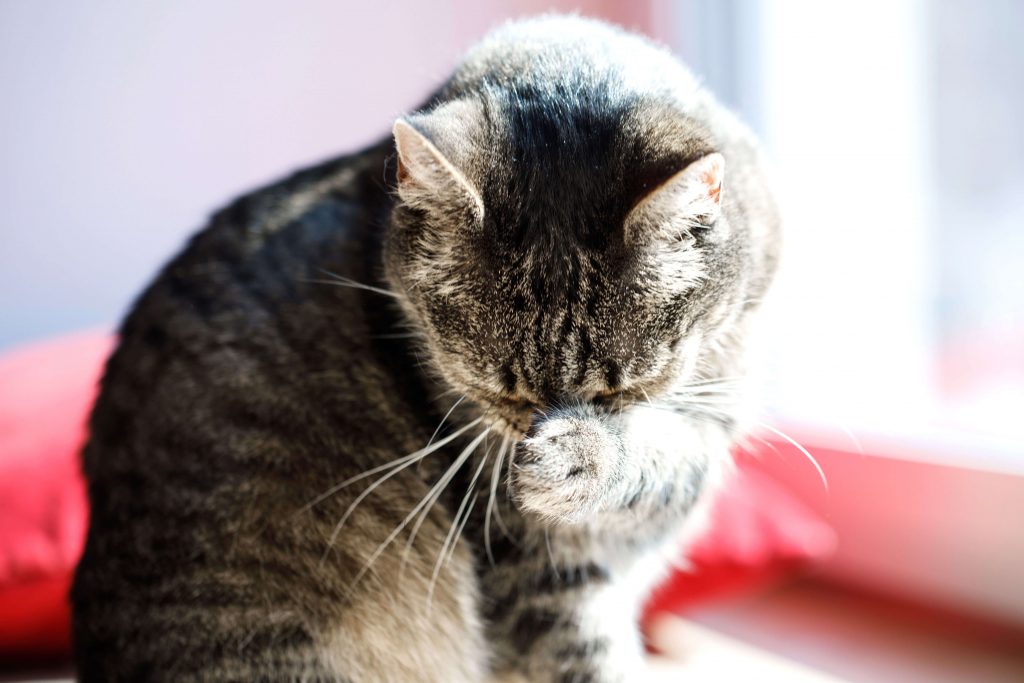
When cats’ eyes water due to injury or disease
A cat’s eyes will water when they become irritated due to injury or illness. If there’s some kind of infection, their eyes will turn slightly red at first. The conjunctiva, which is the thin mucous membrane that lines the inside of the eyelids, will become swollen and their eyes will tear easily. At first, their tears will be clear but very thin. After some time, the tears will become more stringy and slimy. The discharge might even turn yellowish. Your cat will likely have the feeling that there’s something in their eyes that doesn’t belong there. It will blink more often and wipe its paws increasingly over the infected eye.
When your cat’s eyes are watering – When should you go to the vet?
Should I take my cat to the vet if its eyes have started to water frequently? Yes, absolutely! An inflammation of the eye will become more and more painful over time. If the inflammation is in an advanced stage, the eyelid might swell so much that it covers part of the eye. Your cat’s vision will become increasingly cloudy due to the increased fluid. Their field of vision will be severely restricted and they’ll blink or pinch the affected eye. If this doesn’t help, your cat will likely try to keep the eye completely closed.
Memorize:
Some cat breeds have to deal with watery eyes to a greater degree. Especially those cat breeds with somewhat shorter noses will need more eye care than their longer-nosed counterparts. Since their tear ducts are narrower, their eyes water more often. As a result, small, dark rivulets form and crust over easily when dried.
When your cat isn’t shedding tears, but howling loudly

Why do cats sometimes meow very loudly? Is it because they want to tell you they’re sad? Just like us humans, some cats are very talkative, while others prefer to remain silent. Some of them simply have it in their blood, which usually means it’s a breed-specific trait. How a cat communicates also depends on the extent to which it needs to assert itself in its environment. For example, indoor cats often communicate a little more sparingly, as there are fewer opportunities for interaction with others. Many cats simply extend their sphere of communication to include their favourite humans. They might even develop special behaviours and sounds that they reserve solely for humans.
Memorize:
When kittens meow, they’re usually calling for their mother: “I’m hungry, I’m thirsty, help”.
An adult cat that meows is likely looking for some kind of support from you, and it will do so well into old age.
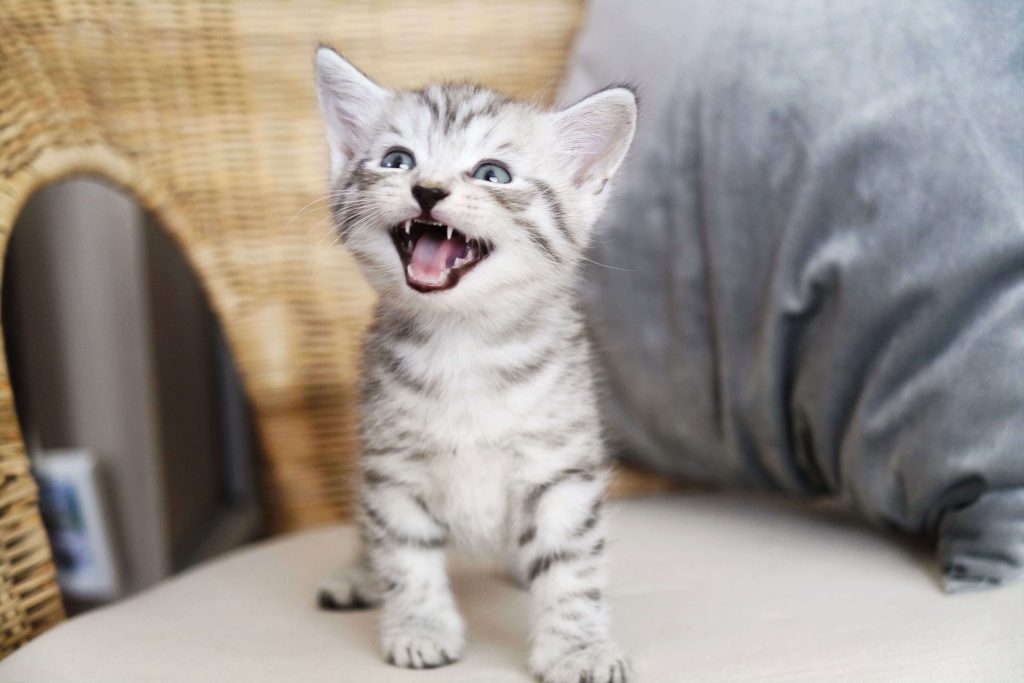
And depending on what the meowing sounds like, your cat might be asking you to help them meet certain needs:
Exuberant, delighted meowing: “I’m so glad you’re here!”
Loud, energetic meowing: “Feed me/ Play with me!”
Whiny, pitiful meowing: “I’m missing something, something hurts!”
Delicate, whisper meows: “Come and cuddle!”
When your cat howls out of boredom
Is your cat’s meowing loud and energetic? It’s possible that your cat is bored and wants you to give them some attention. Some cats also cry at night: if they meow noisily and wake you up every night, you’ll inevitably ask yourself after a few nights whether you made the right decision to share your living space with a feline friend. But there are ways to prevent yourself from getting unsightly dark circles under your eyes from lack of sleep. Learn how to deal with the fact that your cat meows at night.
When your cat howls because it’s in pain
Is your cat meowing pitifully? It’s possible that they’re experiencing some kind of pain. But it’s not always easy to tell if a cat is actually in pain. Cats are anything but cry babies! They don’t usually moan loudly. Not even when they’re badly hurt. But if you notice your cat behaving differently than usual and meowing pitifully, then you can be almost certain that something is bothering them. In that case, they’re going to need help. They’re making those whining sounds so that you can help them.
When your cat howls during a territorial dispute
When your cat gets involved in a fight over territory, you’re definitely going to hear some howling. Cats are smart and usually avoid encounters they think might not go their way. Sometimes, however, it can’t be avoided. Your cat then finds themselves facing an opponent they have to reckon with. There’s only one thing to do in this case: the first step involves hissing. This hissing, however, isn’t a signal that an attack is imminent; they’re just letting everyone know that whatever’s happening is simply going too far for them. If that doesn’t help, it’s on to step two, which involves howling and shrill screaming.
Can cats be sad?

Do cats feel sadness? Cats are sensitive creatures. They perceive the world with all of their senses and are constantly observing and appraising the things going on around them. They can have feelings like joy, pain, anger and sadness. Cats don’t cry per se, but they can still be sad. Cats don’t wear black, nor do they shed “crocodile tears” like us two-legged creatures. When they feel an emotion, they feel it truly and genuinely with their whole soul. If you make the effort or if you’ve had your cat for a long time, you’ll probably figure out very quickly that something’s bothering them by noticing changes in their behaviour.
Recognising when you cat is sad
How can you tell if your cat is sad? If you know how to interpret your cat’s facial expressions and body language, you’ll be able to understand them quite well. Body language in cats is never a matter of chance: every movement, gesture, facial expression and sound is genuine. And their bodies are always communicating something. Of course, every cat is an individual with its own unique personality, and this is also reflected in their body language. In other words, there are no overriding, universally valid standards. But there are scenarios that play out in all cats and give a pretty accurate picture of your cat’s wishes and desires:
- Your cat doesn’t eat
- Your cat is restless
- Your cat secludes itself
- Your cat doesn’t want to play
- Your cat is seeking more closeness
How to cheer up a sad cat
Can I help my cat when it’s grieving? Give your cat the time it needs to say goodbye and grieve whatever is making them sad. When they experience loss, it hurts and takes a lot of patience and calm for them to come to terms with the new situation. Our feline friends feel the same way we do, and when they mourn, it’s a sign that there was a deep sense of connection. Be there for your cat. Talk to them. Even if they don’t always understand the meaning of your words, they will sense the emotional meaning you’re expressing to them.
Do cats notice when you’re sad?
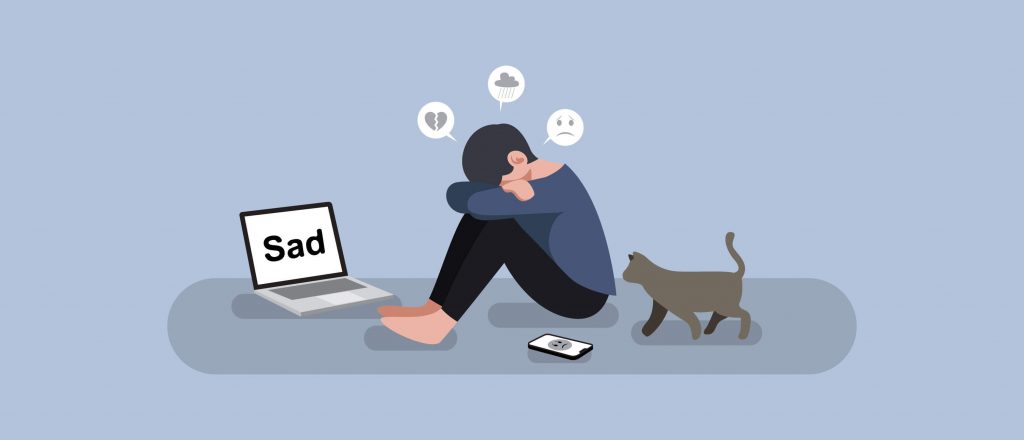
Do cats sense when humans are grieving? Cats are animals that have not completely adapted and submitted to humans the way dogs and other domestic animals have. But our not-fully-domesticated kitties are still hypersensitive. They sense what’s going on inside us. Sometimes, when you’re about to experience an emotional low you don’t even know about yet, you might find your cat already sitting on your lap purring and blinking dreamily at you. Cats are like seismographs on four paws: they sense the tiniest vibration and are able to interpret it correctly. We should be grateful that cats don’t require a prescription! They can have a therapeutic effect on us in difficult times, giving us comfort when we’re sad.
Frequently asked questions about “Can cats cry?”
If your cat’s eyes are watering, it may be an indication that something is bothering them. This might be due to a foreign object or an allergy. A cat’s eyes might also get watery in cold or warm draughts, or if they’ve somehow been injured.
Do cats produce tears? Yes. Cats can shed tears, but they’re not emotional tears. Emotional crying is reserved for us two-legged creatures. This is because only humans have all three types of tears: basal, emotional and reflex. When strong feelings overwhelm us, it’s natural for us to cry.
Cats don’t cry tears when they’re sad, but they can still be sad. Cats are sensitive creatures. They perceive the world with all of their senses and are constantly observing and appraising what’s going on around them. They’re capable of feeling things like joy, pain, anger and sadness, but they grieve without shedding tears.
Yes! Cats are like seismographs on four paws. They sense the tiniest vibration and are able to interpret it correctly. We should be grateful that cats don’t require a prescription. They can have a therapeutic effect in difficult times and give us comfort when we’re sad.
Cats don’t cry in the human sense, but they can still be sad. If you make an effort to observe your cat or if you’ve had your kitty for a long time, you’ll notice relatively quickly that something is different or when something is bothering them, simply by observing changes their behaviour.
Yes, cats can be sad. But cats don’t wear black or cry the way we humans do. The behaviour and body language of our feline friends will show us that they’re sad. They’ll display certain movements, gestures and facial expressions that indicate they’re not happy.
Cats are unique individuals and each one of them deals with grief in their own personal way. While one cat might seclude itself and want to be left alone, another cat might be very restless. Many cats will refuse food when they’re sad. Or they just won’t be in the mood to play.
It’s quite normal for cats’ eyes to water from time to time. These tears serve to moisten and protect the cat’s eyes. However, if your cat’s eyes water very frequently, or if your cat blinks often and wants to keep its affected eye closed all the time, it’s time to go to the vet.
If your cat is howling at night, is it possible they’re trying to tell you they’re sad? An adult cat that meows at night is likely looking for some kind of support from its human companion. And depending on the nature of the meowing, they might be trying to get you to help them meet a specific need.
